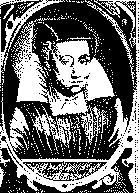

Alexandre de la Main Gauche is Jehanís step-son and the one who really knows the tavern business. He was born to Henri and Phillippe de la Main Gauche -- the original owners of Le Poulet Gauche -- in 1566. Left-handed like his father (originator of the famous 'parrying chicken' maneuver), friends, family, and strangers all call him 'Gaucher' ("Lefty").
He has lived in Calais all his life, although you wouldn't know it to hear the stories he tells. A lifetime of exposure to sailors, pilgrims, and travellers of all sorts have given Gaucher a supply of news, stories, gossip, and dirty jokes that's hard to match. Gaucher is well aware that working hard in a tavern isn't nearly as hard as working hard on the docks or on a fishing boat, and he's pretty thankful about his lot in life -- especially about his stepfather.
It's Gaucher's strongest desire to run an upscale establishment -- without the riffraff, gamblers, and whores (all right, maybe the whores can stay). He's delighted to have a genuine war hero as his patron and stepfather. Gaucher isn't a war-hero -- or a soldier at all -- but he can certainly handle the ocassional violence in Le Poulet Gauche. He's genuinely fond of all of the staff, although even he will admit it's hard to tell at times.
Jeanne-Marie, the cook, fled the sack of Doullens in 1595. Sheís never been completely right since seeing her husband, the steward of a noble house, so horribly murdered before her eyes, but she cooks wonderfully. She was in service to a fairly prosperous household, and her experience with the new Italian cuisine has brought a more refined menu to the Poulet Gauche than it had previously.
Margot washed up on the shores of le Poulet Gauche thanks to Jehanís cousin Thibault and his sailing ship. She claims to be his natural daughter and Jehan's hasn't argued that it isn't so. Margot is content to terrorize the customers and will be perfectly happy never to put to sea or set foot on the road ever again.
Léonor (Eleanor to her English relatives) was born in
Spring 1574, a terribly warm day for the season, to an English mother and
a French father. Her father, Roland, a merchant, met her mother Catherine
in Dover, where Catherine lived with her parents, well-to-do craftspeople.
Leonor was in her late teenaged years when her mother passed away and her
father brought her to Calais to live with his widowed sister while he traveled.
(He never did get along with Catherine's family, and rathered that his
only child not live with them after her mother died.) Soon
after bringing her to Calais, Leonor's father left on a new voyage, one
from which he is yet to return. To earn her keep, Leonor went to work at
the Poulet Gauche, where her aunt was familiar with the innkeeper's son.
M. Jehan was quick to take a liking to Leonor, and when her aunt died after
a year or so, took her into his famille; he even contributes to her
dowry on occassion, so that she might "find better prospects in a husband"
than her most steady admirer. Leonor boasts of her early education
in reading and writing and keeps a sharp ear out for news
of her father or his two merchant brothers. She is known as "honest",
but sometimes "gullible". Just ask her about the time a prince came
to the Inn....
Fabi is originally from Brussels. The Low Countries are in revolt against the Spanish crown, and she fled the fighting landing in Calais just a month before the Spanish took it over. While she is friendly with all the customers, she is definitely flirtatious with the men. [ed. note: flirtatious is probably insufficient a description -- let's say that Fabi is the most enterprising of les jeunes filles that work here, and she's accumulating a healthy nest egg in the old sock under her bed...]
Justin du Coeur (sometimes known as "Ace") is a dancemaster and gamester who spent several years teaching English lawyers how to dance Italian dances badly (all the rage in Elizabeth's court) before getting homesick and coming back to France. He was getting by on some day-to-day card sharping and his small nest egg from London when Calais was invaded. After a bit of hesitation, he's wound up staying in Calais, having realized that the Spanish soldiers are eager, but not especially talented, gamblers. He doesn't actually room at Le Poulet Gauche (he keeps a cheaper room across town), but spends much of his time there.

The Poulet Gauche staff have occasional persona workshops, where we do exercises like those of improvisational actors. In many ways, what we do is a kind of historical improv theatre. Knowing your character, you can respond to any situation in a natural way. Examples of these exercises are to go around and have each person answer questions like, "What's one thing you know about yourself? What's one thing you know about someone else? What's one thing that happened to you today? What's the best food you ever had?"
When dealing with our patrons in the tavern, we try to follow the example set by the superb interpreters at Plimoth Plantation. Each plays a documented colonist and stays in character all the time. They are wonderfully polite at failing to understand what you mean when you try to discuss twentieth-century matters with them, and are good at trying to help their visitors frame their questions in a way that they can answer them. For example, asked if she "had a boyfriend", a colonist can get her questioner to explain enough so that she can answer, "Ah, do you mean is a young man courting me?"
When some people first come to the Poulet Gauche, they are terrified that there's nothing to talk about. But the truth is, pregnancy is period and so are births, deaths, marriages, separations, courtships, congratulations and envy on honors and privileges, compliments, cattiness, flirtation, boasting, haggling. In many ways the stuff of human conversation has changed very little. And with just a little bit of thought, even those annoying meta-conversations can be redirected in a way that enriches the experience. "Hello, I'm in town to sell sheepskins at the fair..." "I've never heard of an author named Playford, but in my country we do this dance..." "The way my grandmother used to make that kind of pie is..."
You may just be a visitor to the Poulet Gauche, but historical recreation becomes more real (and fun!) as you invest more in your period persona. For some insights into this, see the follow resources:
For interviews with members of the family, where we answer the kinds of questions posed by Cariadoc in the aforesaid essay, see: